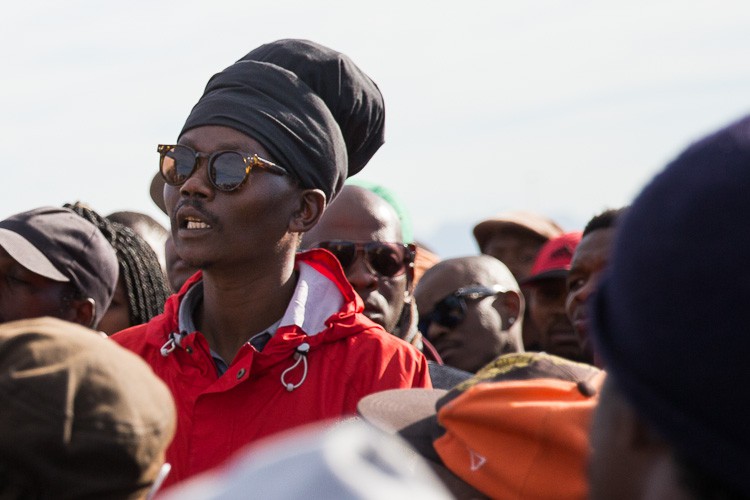Community leader shot dead after massive Khayelitsha land occupation
Backyarders vow to continue battle for land
A group of Khayelitsha backyarders, who orchestrated a large land occupation in Cape Town two weeks ago have vowed to continue their fight for land. This follows the fatal shooting of one of the group’s leaders Mthunzi ‘Ras’ Zuma on Sunday night. Police spokesperson Noloyiso Rwexana said no arrests have been made.
One of the land occupiers, Mabhelandile Twani, said that they would not stop fighting for the land. “We will not stop even if it means I will die. I would have died fighting for a decent place to stay. The struggle continues,” he said.
Hundreds of people, mostly backyarders in Town Two, began their occupation on 15 May, demarcating hundreds of sites on vacant pieces of land in the area. One of the pieces of open land is next to the Khayelitsha Magistrates’ Court. The other two sites were in Makhaya and Kuyasa.
Last week, GroundUp visited the area where some of the erected structures were being demolished. Hundreds of sites were also demarcated on the land. The occupation is one of the biggest in the city in recent years.
The backyarders say they are tired of renting and living with their parents, while a large piece of land has been empty for years.
On 28 May, community leader Zola Booi told GroundUp that the shooting occurred after they had barricaded the road next to the vacant land.
“A car came and two people got out and asked what was going on. Ras explained to them. The driver then got out and asked whether he was Rasta. He was then shot in the head,” said Booi.
Booi now fears for his own life.
The City confirmed to GroundUp this week that it owns all the occupied sites in Khayelitsha, with the exception of two plots owned by the Western Cape government.
Backyarders don’t trust organisations
Occupiers said they had lost all trust in the organisations working in the area. These include the Khayelitsha Development Forum (KDF) as well as Khayelitsha Community Trust (KCT).
KCT is responsible for developing the occupied area in Town Two. The organisation signed a land availability agreement with the City in 2003.
Part of the occupied land has been earmarked for gap housing, which would accommodate people earning more than R3,500 and less than R15,000 a month. “The gap housing still wouldn’t accommodate us. We are here during the week so we don’t work, and don’t even have an income,” said resident Martin Xabangela.
KCT CEO Mkhululi Gaula said that the 22 hectares of the land was meant to be developed in 2015. He said there was a delay due to “legal matters” as well as the transfer of land from the City to KCT. The transfer process has not yet been completed.
“We have had two meetings with the occupiers, and have made it very clear that it is not acceptable [to occupy the land], and that they will be accommodated when the development is done,” said Gauda.
Mayoral Committee Member for Informal Settlements Councillor Xanthea Limberg urged residents to register on the City’s housing database in order to access the housing opportunities planned for the area.
A memorial service for Mthunzi ‘Ras’ Mosiah Zuma will be held on 4 June at 2pm at Kilombo Village, Joe Modise Street, Makhaya, Khayelitsha
Support independent journalism
Donate using Payfast

Don't miss out on the latest news
We respect your privacy, and promise we won't spam you.
© 2017 GroundUp. 
This article is licensed under a Creative Commons Attribution-NoDerivatives 4.0 International License.
You may republish this article, so long as you credit the authors and GroundUp, and do not change the text. Please include a link back to the original article.

